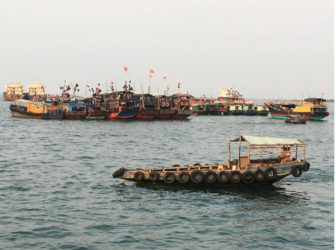BAIMAJING, China, (Reuters) – The fishing fleet based in this tiny port town on Hainan island is getting everything from military training and subsidies to even fuel and ice as China creates an increasingly sophisticated fishing militia to sail into the disputed South China Sea.
The training and support includes exercises at sea and requests to fishermen to gather information on foreign vessels, provincial government officials, regional diplomats and fishing company executives said in recent interviews.
“The maritime militia is expanding because of the country’s need for it, and because of the desire of the fishermen to engage in national service, protecting our country’s interests,” said an advisor to the Hainan government who did not want to be named.
But the fishing militia also raises the risk of conflict with foreign navies in the strategic waterway through which $5 trillion of trade passes each year, diplomats and naval experts say.
The United States has been conducting sea and air patrols near artificial islands China is building in the disputed Spratlys archipelago, including by two B-52 strategic bombers in November. Washington said in February it would increase the “freedom of navigation” sail-bys around the disputed sea.
The city-level branches of the People’s Armed Forces Department provide basic military training to fishermen, said the Hainan government advisor. The branches are overseen by both the military and local Communist Party authorities in charge of militia operations nationwide.
The training encompasses search and rescue operations, contending with disasters at sea, and “safeguarding Chinese sovereignty”, said the advisor who focuses on the South China Sea.
The training, which includes exercises at sea, takes place between May and August and the government pays fishermen for participating, he said.

Government subsidies encourage fishermen to use heavier vessels with steel – as opposed to wooden – hulls.
The government has also provided Global Positioning Satellite equipment for at least 50,000 vessels, enabling them to contact the Chinese Coast Guard in maritime emergencies, including encounters with foreign ships, industry executives said.
Several Hainan fishermen and diplomats told Reuters some vessels have small arms.
When “a particular mission in safeguarding sovereignty”, comes up government authorities will coordinate with the fishing militia, the advisor said, asking them to gather information on the activities of foreign vessels at sea.
ROW WITH INDONESIA
That coordination was evident in March, when Indonesia attempted to detain a Chinese fishing vessel for fishing near its Natuna Islands in the South China Sea. A Chinese coast guard vessel quickly intervened to prevent the Indonesian Navy from towing away the fishing boat, setting off a diplomatic row. Beijing does not claim the Natunas but said the boats were in “traditional Chinese fishing grounds”.
China claims almost all of the South China Sea. The Philippines, Malaysia, Vietnam, Taiwan and Brunei also have conflicting claims over the islets and atolls that constitute the Spratly Archipelago and its rich fishing grounds.
State-controlled fishing companies dominate the fleets that go regularly to the Spratlys and are recipients of much of the militia training and subsidies, industry sources said.
China has by far the world’s biggest fish industry, but depleted fishery resources close to China’s shores have made fishing in disputed waters an economic necessity, fishermen and industry executives say.
State-owned Hainan South China Sea Modern Fishery Group Company says on its website it is “both military and commercial, both soldiers and civilians”. One of its aims, the company says, is to let the “Chinese flag fly” over the Spratlys.
“Defending sovereignty is primarily the government’s concern,” said Ye Ning, the company’s general manager, in an interview at his office in Haikou. “But of course, regular folks being able to fish in their own countries’ waters should be the norm. That goes for us too.”
The company provides fishermen who sail to the Spratlys with fuel, water, and ice, and then purchases fish from them when they returned, according to a written introduction to the company’s work executives provided to Reuters.
‘LOT MORE RISKY’
“It’s gotten a lot more risky to do this with all kinds of foreign boats out there,” said Huang Jing, a local fisherman in the sleepy port town of Baimajing, where a line of massive steel-hulled fishing trawlers stretches as far as the eye can see.
“But China is strong now,” he said. “I trust the government to protect us.”
Chen Rishen, chairman of Hainan Jianghai Group Co. Ltd, says his private but state subsidised company dispatches large fleets of steel-hulled trawlers weighing hundreds of tonnes to fish near the Spratly Islands. They usually go for months at a time, primarily for commercial reasons, he said.
“If some foreign fishing boats infringe on our territory and try to prevent us from fishing there … Then we’re put in the role of safeguarding sovereignty,” he said in an interview in Haikou, the provincial capital of Hainan.
China does not use its fishing fleet to help establish sovereignty claims in the South China Sea, foreign ministry spokesman Lu Kang said: “This kind of situation does not exist.”
China had taken measures to ensure the fishing fleets conduct business legally, he told a ministry press briefing last month.
RULES OF ENGAGEMENT
Chen said his fishermen stop at Woody Island in the Paracel islands, where China recently installed surface-to-air missiles, to refuel and communicate with Chinese Coast Guard vessels.
They look forward to using similar facilities China is developing in the Spratly Islands, he said.
China has been pouring sand from the seabed onto seven reefs to create artificial islands in the Spratlys. So far, it has built one airstrip with two more under construction on them, with re-fuelling and storage facilities.
“This all points to the need for establishing agreed protocols for ensuring clear and effective communications between civilian and maritime law enforcement vessels of different countries operating in the area,” said Michael Vatikiotis, Asia Director of the Centre for Humanitarian Dialogue, which is helping claimant states design such confidence building measures.
A regional agreement on communications and procedures when rival navies meet at sea applies only to naval ships and other military vessels, he said.




